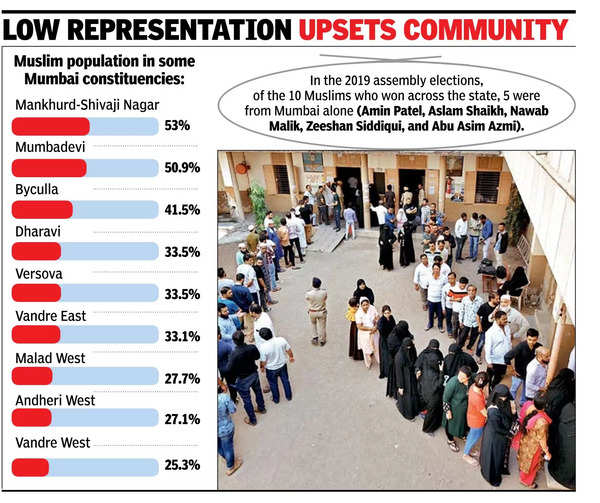MUMBAI: The Muslim population in Mumbai is roughly 20% and there are around 10 seats in the city where the community has a population going up to 25% or more. Yet, in the candidate lists of major parties, the number of Muslims range from one to four.
Among major parties, the Congress followed by NCP (Ajit Pawar) have allocated more seats this time to Muslim representatives though even their numbers are low. The Congress has nominated four-Amin Patel (Mumbadevi), Aslam Shaikh (Malad West), Asif Zakaria (Bandra West) and Naseem Khan (Chandivali).
Shiv Sena (UBT) has fielded its lone candidate Harun Khan in Versova, while NCP (SP) has fielded Fahad Ahmed from Anushakti Nagar. Ahmed is pitted against Nawab Malik’s daughter, Sana Malik, who is the NCP (Ajit Pawar) nominee. Malik himself has filed a nomination as an NCP (Ajit Pawar) nominee from Mankhurd-Shivajinagar against sitting MLA, Abu Asim Azmi of the Samajwadi Party, while Zeeshan Siddiqui, who quit Congress, is the NCP (Ajit Pawar) candidate in Bandra East.

Among smaller parties, Prakash Ambedkar-led Vanchit Bahujan Aghadi (VBA) has nominated 9 Muslims while AIMIM has fielded four.
The run-up to ticket distribution and the aftermath of candidate selection has been marked by expressions of discontentment from leading members of the minority community, who have questioned the lack of proportional representation in selection.
“The mood in the community is sullen. A sense of betrayal seems to have gripped them as the number of nominations from the community is much below what they expected,” said NCP functionary and former Minorities Commission chairman Naseem Siddiqui.
The disappointment is more so because the minority vote had consolidated in large numbers in various pockets across the state in favour of the MVA in the Lok Sabha polls. The unprecedented mobilisation even prompted some Mahayuti leaders to describe it as “vote jihad”.
Minority members were not expecting surprises this time from the BJP and its right-wing allies in candidate selection, especially given the incidence of hate speech and other forms of communal provocation over the last few years. But dissatisfaction is strong against the MVA. Barring familiar faces such as Aslam Shaikh or Naseem Khan, who have nursed their constituencies for several years, the opposition list is devoid of any new names.
In the Lok Sabha elections, Muslim-dominated assembly segments helped swing the outcome for MVA candidates in several seats. This eventually helped MVA (Congress, Sena UBT, and NCP of Sharad Pawar) win an impressive 31 seats out of 48 in the state. In Mumbai, four of the six Lok Sabha seats were won by MVA with the Shiv Sena (UBT) benefiting the most from the community’s support.
Byculla, Dharavi, Andheri West and Sion Koliwada are cited as areas from where the MVA, especially Sena (UBT), could have helped prop up more Muslims in the assembly polls to give them greater representation and acknowledge the community’s support. Many refer to Byculla as a glaring example, where Sena (UBT) instead chose to field Manoj Jamsutkar.
The Byculla assembly segment, along with Mumbadevi, helped MVA candidate Arvind Sawant win the South Mumbai Lok Sabha seat. Sawant got 86,883 votes against Mahayuti’s Yamini Jadhav’s 40,817 in Byculla. Mumbadevi is another Muslim-dominated segment which gave a huge lead to Sawant in the Lok Sabha-77,469 votes against Jadhav’s 36,690. Congress sitting MLA Amin Patel faces Eknath Shinde Sena’s Shaina NC in Mumbadevi.
This time, a chunk of Muslim votes in some constituencies may even go to smaller parties such as All India Majlis-e-Ittehad-ul-Muslimeen (AIMIM), VBA and Rashtriya Ulama Council. The reasons for the fragmentation are manifold. Apart from MVA’s ambivalence about overtly wooing minorities, the issues in the assembly polls are seen to be somewhat different from those in the general elections. For one, “the threat to the Constitution” – which became a defining factor in Lok Sabha polls – is no longer relevant. Secondly, a slew of welfare schemes launched by the Eknath Shinde-led govt has benefited large sections of the Muslim community too.
Dismissing talk of any vote consolidation that would help the opposition, a Muslim Congress leader, requesting anonymity, said, “If three strong Muslim candidates fight against one BJP nominee, you can easily guess the outcome.”
